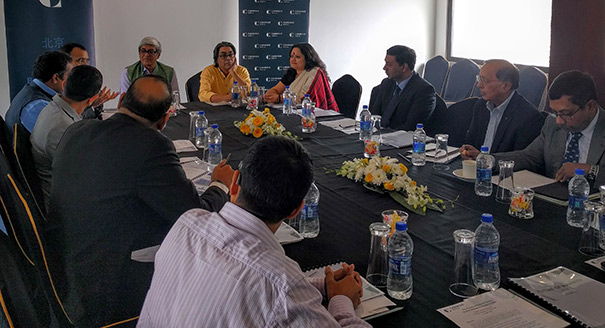Registration
You will receive an email confirming your registration.
Despite recent steps taken by the government, the Small and Medium Enterprise (SME) sector in India is largely informal and continues to face significant problems. There is a need to incentivize registration, provide easier access to finance, and bolster the formal participation of women in the sector.
Carnegie India organised a roundtable discussion that brought together various stakeholders to discuss the Future of Business Survey, an online survey of SMEs, and the state of SMEs in India. The discussion was led by Dr. Shubhashis Gangopadhyay, research director at the India Development Foundation, and chaired by Dr. Bibek Debroy, member at the NITI Aayog.
DISCUSSION HIGHLIGHTS
- The Future of Business Survey’s Outlook for India: With more than 60 million SMEs on Facebook globally, the survey was developed to provide policy-relevant data and receive feedback on how firms used online tools. Participants explained that the results showed that SMEs in India are bullish in terms of future outlook. However, they added, it also pointed to the low share of women in leadership positions, mirroring the national trend. The survey also pointed to the real action in this sector taking place at the sub-national level.
- Data Issues: Participants discussed the difficulties in collecting data on India’s Micro, Small, and Medium Enterprises (MSME) sector. They pointed to the unrepresentative nature of the World Bank’s Ease of Doing Business Rankings, which fails to capture business activity outside of select metropolitan centres. Participants also emphasized that the MSME Ministry’s census primarily captures registered enterprises, less than 5 percent of all such enterprises, and only conducts sampling for the remaining unregistered enterprises. On the inter-state survey conducted by the Department of Industrial Policy and Promotion, participants suggested that replacing inter-state rankings with a grading scheme would promote healthier competition. Further, to have a more accurate overview of the MSME sector, a participant suggested focusing specifically on states with better data conditions, or focusing on the Small Scale Industry segment instead of the MSME. On similar lines, another participant drew attention to intra-state disparities and suggested focusing on certain regions within states. Finally, participants deliberated on the methodology of a proposed Rate of Change Index study designed to capture state-wise preparedness for digital tools.
- Encouraging Registration: While many SMES consciously chose not to register themselves, according to the third MSME Census, participants noted the recent sharp increase in registration in Gujarat and Maharashtra, which they argued owes to a simplification of the registration process. Given that unregistered enterprises cannot partake in various government benefits, participants suggested that registration can be incentivized by spreading better awareness of government programs like Zero Defect and Zero Effect (ZED) that aim to improve the quality and competitiveness of SMEs.
- Improving Access to Finance: Participants discussed the need for reforming the financial sector. They agreed that the banks’ insistence on personal guarantee, even in cases of collateral-free loans, is a major stumbling block. Existing Reserve Bank of India guidelines were found to be largely inadequate. Further, they said, credit for project finance, not working capital, is problematic. For this, a participant pointed to the willingness of Non-Banking Financial Corporations to step in. Participants also recognized that the banks’ reluctance to lend stems from the lack of financial transparency of the enterprises–due to deliberate opacity or financial illiteracy. The possible role of online tools in resolving both causes was discussed. In the first case, big data-based lending, based on Facebook and other tools, was suggested as an alternative to asset-based lending. In the second case, participants discussed the possibility of Facebook collaborating with banks to create a repository of finance-related tutorials.
- Government Policies: Participants discussed the drawbacks in existing government policies toward MSMEs and SMEs. Despite legislation on delayed payments to MSMEs, participants pointed to continued problems. One participant made some suggestions, including:
- First, that in case of a delayed payment to an MSME, given that a major proportion of these originate from public sector undertakings, their respective banks should make good on the payment after 45 days.
- Second, the Credit Guarantee Fund Scheme only covers 90 percent of the credit facility and leaves the burden of the remaining 10 percent on banks.
- Third, while the government delivers services to the sector via clusters, gaps need to be bridged between lead clusters and intermediate clusters.
- Female Participation: Participants discussed the social dimension of the low female participation, such as problems in acquiring credit when most women do not have titles in their name as well as perceptions of harassment by government agents. A participant pointed to the draft women’s industrial policy in Maharashtra that lays out various measures to improve female participation rates–from establishing a dedicated MSME development institute for women to providing capital incentives and subsidies, along with establishing a fund for project finance. On the other hand, another participant pointed to the high participation of women in the informal MSME sector. To include them formally, knowledge sharing is important, participants agreed. A participant proposed raising the first-time guarantee cover for credit facilities to 100 percent for women, along with phasing out guarantees for subsequent instances.
This event summary was prepared by Sharanya Rajiv, an intern at Carnegie India.
